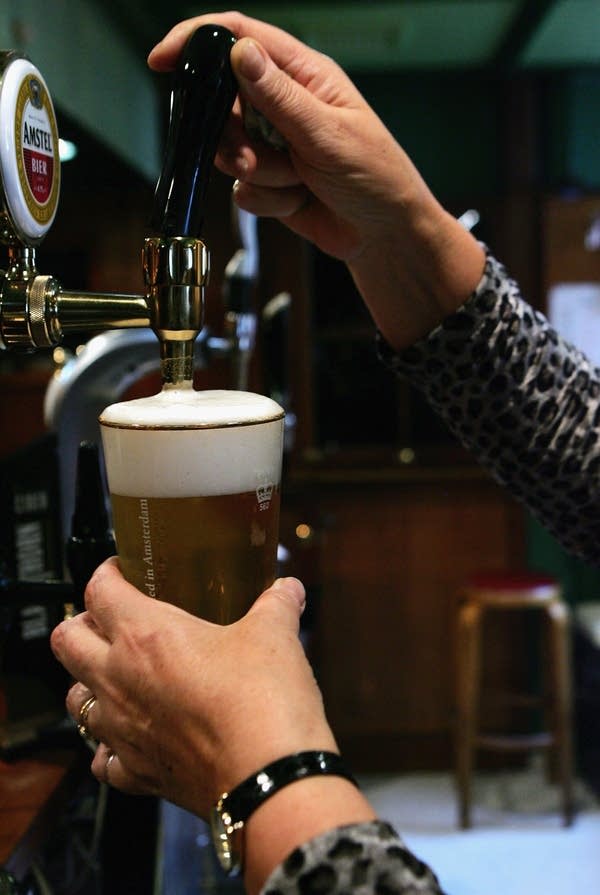New research, old finding: higher price, less drinking
Go Deeper.
Create an account or log in to save stories.
Like this?
Thanks for liking this story! We have added it to a list of your favorite stories.

New research from the University of Florida concludes that raising the price of alcohol reduces the amount people consume.
The research has researchers and tavern owners arguing an age old debate: Should state liquor taxes be increased to reduce drinking problems, including drunk driving? The difference this time though, is that the legislature is sitting out this round of the debate--meaning Minnesotans shouldn't expect a policy change anytime soon.
Charles Senkler, the owner of Fabulous Ferns, a successful St. Paul restaurant and bar on Selby avenue, has nearly 40 years of experience in the business.
His abiding view from that experience is increasing beer, wine and liquor taxes has little, if any, effect on consumption.
Turn Up Your Support
MPR News helps you turn down the noise and build shared understanding. Turn up your support for this public resource and keep trusted journalism accessible to all.
"It makes a little bit of difference to the casual drinker the social drinker. It doesn't affect the problem drinker at all," he said.
University of Florida Epidemiology Professor Alexander Wagenaar's new study analyzed dozens of previous studies on the topic and disagrees with Senkler's conclusion.
"If people are arguing that the price doesn't have an effect on how much people drink, that's simply not the case," Wagenaar said.
Wagenaar said the conclusion that emerges is even a relatively modest alcohol price increase has an effect.

"If you increase the price by ten percent, drinking will go down by about five percent," he said.
University of Minnesota's Traci Toomey, an associate professor of epidemiology, says the research addresses the collective behavior of tens of millions of alcohol drinkers as opposed to how an individual drinker reacts to higher liquor prices.
"That one person might say, 'Oh of course it doesn't make a difference', but if we look at a whole population of people even a small increase makes a difference and we see decreases in problems like traffic crashes," she said.
Alcohol consumption is linked to hundreds of billions of dollars in public safety and health costs, the best known being the role of alcohol in traffic crashes.
Across the country traffic fatality rates are declining. In Minnesota last year, the 455 people killed in vehicle crashes marked another annual reduction continuing a pattern over the past four decades.

But there's been no change in the proportion of fatalities caused by alcohol.
Minnesota Traffic Safety Director Cheri Marti says alcohol is a factor in more than a third--163--of last year's fatal crashes.
"The total percentage of alcohol related fatalities has remained the same, it's still about 35 percent of our total road fatalities," she said.
Increasing the price as a way to try reduce the role booze plays in crashes is not on the table this legislative session in St. Paul. The governor and some lawmakers oppose any new taxes.
That opposition helped kill a proposal last session to raise the state's excise on liquor, beer and wine.

The state excise tax hasn't been raised since 1987 and the federal excise tax hasn't been raised since 1991.
That means inflation has eaten a way a big portion of the value of the $73 million the state collected in 2008 liquor excise taxes, the most recent numbers available. Bar owners, it's safe to say, don't feel undertaxed.
And yet, University of Florida's Alexander Wagenaar said this country's reluctance to raise liquor excise taxes is at odds with the costs associated with drinking.
"There are costs that we pay elsewhere," Wagenaar said. "We pay it in our car insurance. We pay it in our health insurance. We pay it in our taxes and public support for our hospitals and emergency departments and extra police attention."
The Minnesota Licensed Beverage Association represents Minnesota liquor retailers and wholesalers and their Executive Director, Frank Ball, says beware of more taxes on a hospitality industry that is a big part of the state's tourism business and important source of jobs.
"Consumable alcohol and these drinking establishments are big pluses to get us in here," he said. "Overtaxing it isn't the answer."
Ball said the answers to bringing down the societal costs of alcohol consumption are personal responsibility, more education and stiffer penalties for drunk drivers.
That's the course the governor and lawmakers are pursing this session at the legislature.




